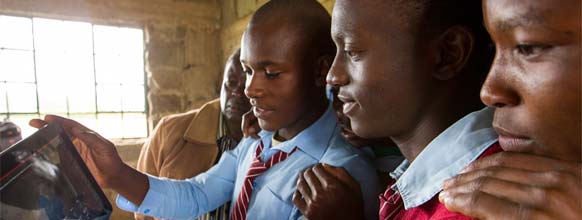Microsoft, Huawei bring sub-$150 smartphones to Africa
US software giant Microsoft this week pledged to invest around $74m in Africa over the next three years, introducing tens of millions of smart devices into the hands of the local youth and bringing over a million small and medium sized enterprises online.
February 5, 2013

US software giant Microsoft this week pledged to invest around $74m in Africa over the next three years, introducing tens of millions of smart devices into the hands of the local youth and bringing over a million small and medium sized enterprises online.
Under the banner of the Microsoft 4Afrika Initiative, the company will actively engage in Africa’s economic development to improve its global competitiveness, giving skills to 100,000 members of Africa’s existing workforce and helping an additional 100,000 recent graduates develop employability skills, 75 per cent of whom Microsoft will help place in jobs.
A key element of the project is to increase the adoption of smart devices, which Microsoft aims to do by tapping Chinese vendor Huawei to introduce the 4Afrika full-functionality Windows Phone 8 device at a sub-$150 price tag.
The device will be preloaded with select applications designed for local users initially in Angola, Egypt, Ivory Coast, Kenya, Morocco, Nigeria and South Africa from this month.
Students and small businesses will be a target for the company’s smartphone portfolio, and through an SME Online Hub, African SMEs will have access to free, relevant products and services from Microsoft and other partners. The hub will aggregate the available services, which can help SMEs expand their businesses locally, find new business opportunities outside their immediate geographies and help increase their overall competitiveness. The hub is expected to initially open in April in South Africa and Morocco and will expand to other African markets over time.
A pilot project with the Kenyan Ministry of Information and Communications and Kenyan internet service provider Indigo Telecom will deliver low-cost, high-speed, wireless broadband focused on the creation of opportunities for commerce, education, healthcare and delivery of government services across Kenya. It claims to be the first deployment of solar-powered base stations working together with TV white space spectrum, which Microsoft Research is heavily interested in, to deliver internet access to areas currently lacking even electricity. Microsoft hopes to implement similar pilots in East and Southern Africa in the coming months.
Meanwhile, the Afrika Academy, an education platform with online and offline learning tools, aims to help Africans develop both technical and business skills for entrepreneurship and improved employability. Training through the Afrika Academy will be available starting in March at no cost to recent higher education graduates, government leaders and the Microsoft partner community.
“The world has recognised the promise of Africa, and Microsoft wants to invest in that promise. We want to empower African youth, entrepreneurs, developers, and business and civic leaders to turn great ideas into a reality that can help their community, their country, the continent and beyond,” said Fernando de Sousa, general manager, 4Afrika Initiative. “The 4Afrika Initiative is built on the dual beliefs that technology can accelerate growth for Africa, and Africa can also accelerate technology for the world.”
AfricaCom 2013 takes place November 12-14 in Cape Town, South Africa.
About the Author(s)
You May Also Like








.png?width=300&auto=webp&quality=80&disable=upscale)


_1.jpg?width=300&auto=webp&quality=80&disable=upscale)


.png?width=800&auto=webp&quality=80&disable=upscale)